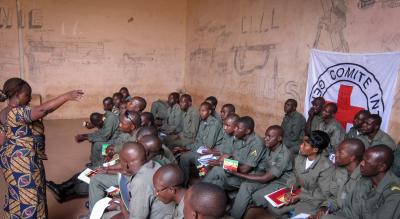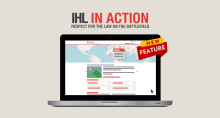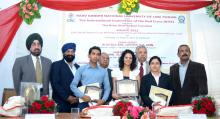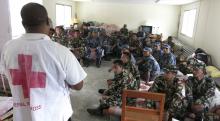Case prepared by Laura Di Gianfrancesco, Reine Pfister and Thilo Tesing, LL.M. students at Roma Tre University under the supervision of Giulio Bartolini (Professor) and Tommaso Natoli (Research assistant), Roma Tre University IHL Legal Clinic; with the contribution of Jemma Arman and Isabelle Gallino, LL.M. students at the Geneva Academy.
A. MALI: ARMED GROUPS LEARN INTERNATIONAL HUMANITARIAN LAW
Members of the National Movement for the Liberation of Azawad (MNLA) and of the High Council for the Unity of Azawad (HCUA) are attending a course on international humanitarian law which is being given by the International Committee of the Red Cross (ICRC) in Kidal.
The training started on October 1, 2014 were [sic] the participants are made aware in particular of issues relating to the protection of civilians and people no longer taking part in hostilities, the treatment of people who have been captured, and respect for humanitarian principles.
“This is one session in a series that began a few weeks ago. So far, we’ve raised awareness of international humanitarian law among more than 200 fighters of the MNLA, the HCUA and the Arab Movement of Azawad in Ménaka, Ber and Kidal,” said Christoph Luedi, head of the ICRC delegation in Mali. “The long-term goal is to make these armed groups aware of their responsibilities in terms of respect for international humanitarian law, and to help them to better understand the rules of behaviour applicable in conflict situations.”
International humanitarian law is a set of rules designed to limit the effects of armed conflict. It protects people who are not or are no longer taking part in hostilities and restricts the means and methods of warfare.
“It’s because of the good relations we have had for many years with the leadership of these various armed groups that we are able to give this course,” said Mr Luedi. “In accordance with its mandate, the ICRC has dialogue with all parties to the conflict and provides them with the support they need in the area of international humanitarian law.”
The ICRC, in its capacity as a neutral and impartial humanitarian organization, has contacts with everyone involved in the conflict in Mali. For several years it has helped all armed forces achieve a better understanding of and show greater respect for international humanitarian law.
B. MALI: TRAINING AND DISCIPLINE TO IMPROVE IHL COMPLIANCE
The ICRC is helping promote international humanitarian law (IHL) among the Malian armed forces, international forces operating in the country and other arms bearers. General Mahamane Touré is Chief of the General Staff of the Malian armed forces. He talked to us about the importance of IHL.
"The Malian army is present in large areas of the country from which both the State and justice are often absent. In a sense, therefore, we represent the Malian State, and the Malian State has to be seen, perceived and understood as just, and as the protector of its citizens. It is therefore very important that members of the armed forces promote law and justice, wherever they may be."
Would you say that IHL is well known and respected by the Malian armed forces?
IHL is taught at all our military training establishments. Awareness-raising activities are carried out as part of all training courses, and in the field. But it will take time before everyone internalizes IHL and makes it part of their habits.
The "Kouroukan Fouka" charter, which predates the Universal Declaration of Human Rights, shows that respect for the citizen, for the law and for order are deeply-rooted in our history. Today, we have to show that we are true to our history.
Strict compliance with IHL by all of our personnel is still an objective to be attained, but I am convinced that the majority of personnel have understood the importance of IHL and endeavour to apply it. What is very important is that military personnel respect the rights of the citizen and that the citizen respects military personnel and can live alongside them in complete confidence. Only if this is the case can our soldiers do their job. We therefore have to earn this confidence.
What about the responsibilities of commanders?
The commander's first responsibility is to select the right personnel and to ensure that they are properly supervised and trained. This requires leaders of quality, who are competent and aware of the responsibility they bear for the young soldiers under their command.
It is also the commander's responsibility to take disciplinary action when the law is not obeyed. We are currently building an army in which commanders are aware of their responsibilities.
Do you have internal disciplinary measures in place to deal with breaches of IHL?
We certainly do! These measures are mentioned in the Constitution and in army regulations. To take one example, Art. 3 of the Malian Constitution states that "any individual, any State official guilty [...] of ill-treatment, abuse or inhuman, cruel, degrading or humiliating treatment, be it on his own initiative or in response to an order, shall be punished in accordance with the law."
We have also set up a mechanism for all military units in the field, consisting of independent provost staff authorized to assess the actions of personnel and report back to their chain of command, or to the ministry of defence. Their reports are automatically passed on to the judicial authorities. In addition, we have an effective Judge Advocate-General's Department, with its own court.
So we have a whole range of disciplinary measures available, and they apply to all.
What is your opinion of the support that the ICRC provides to the Malian armed forces?
The ICRC's support enables us to be sure that we are operating in accordance with the law. It also enables us to correct any deficiencies in this respect. By enabling our commanders to attend courses, the ICRC gives us an opportunity to meet others, to learn from their experiences and to develop.
The close support that the ICRC provides through its regular contact with our personnel in the field, training them and reminding them of their responsibilities towards the population, is very important. The same is true of the basic IHL manual on which we have been working together for a number of months. This will give us a teaching aid specific to the Malian army that will take account of our particular circumstances. It will be issued to all unit commanders.
I would also like to mention your visits to prisoners, in particular to prisoners of war, to listen to them, to support them and to pass on messages from their family, all of which you do very discreetly. And then of course there's the confidentiality that you observe with regard to certain subjects.
How useful are the tools developed in conjunction with the ICRC?
These training aids are excellent. The little IHL handbook for soldiers, which is simple and well-illustrated, is particularly effective. As is often said, a picture is worth a thousand words. I appreciate the effort that has been made to simplify the messages, so that they enter a soldier's subconscious and ensure that he reacts correctly.
If you had to say just a couple of words about IHL to your men, what would they be?
I would like to remind all members of the Malian armed forces that their first duty is that of self-respect. The first rule is to know who we are, what values we project and, above all, that we are Malians. International humanitarian law sets out a certain number of rules that are reflected in our doctrine, in the Malian Constitution and in the rules and regulations of the army. All of these instruments are based on the principle of respect for our fellow-citizens.
I am counting on each and every one of you to respect these rules, as you represent the State wherever you may be, because they form the foundation of our society and of our armed forces. It is in accordance with these rules that we will be judged.
Discussion
I. Classification of the Situation and Applicable Law
1. How would you qualify the situation in Mali? What additional information would you require in order to make such a determination? Under which conditions would Additional Protocol II be applicable? (
GC I-IV, Art. 2 and
Art. 3;
P II, Art. 1).
II. Dissemination of IHL
2. Are States obliged to teach their soldiers about IHL? During times of armed conflict? In peacetime? (
GC I-IV, Art. 1;
GC I, Art. 47;
GC II, Art. 48;
GC III, Art. 127;
GCI V, Art. 144;
P I, Art. 83;
P II, Art. 19;
CIHL, Rule 142). Do army commanders have a legal responsibility under IHL to ensure IHL dissemination? (
P I, Art. 87;
CIHL, Rule 153).
3. Do a State’s obligations to disseminate IHL extend to non-state armed groups operating within its territory? How can a State implement its obligations in this respect?
III. Elements contributing to respect for IHL
5. Does it take a lawyer to understand the Geneva Conventions? Which rules do you think are easy to understand and to teach? Which rules do you think would be difficult to understand? What educational tools can be used to make IHL dissemination easier?
6. (Document B) Why is it important for soldiers to “internalize IHL and make it part of their habits”?
7. What are the advantages for the ICRC of developing long term relationships with parties to the conflict? What are the risks, in terms of perceptions of neutrality? How might these risks be mitigated?






